Paul Reveres Ride
PAUL REVERES RIDE
DAVID HACKETT FISCHER

Oxford University Press
Oxford New York
Athens Auckland Bangkok Bombay
Calcutta Cape Town Dar es Salaam Delhi
Florence Hong Kong Istanbul Karachi
Kuala Lampur Madras Madrid Melbourne
Mexico City Nairobi Paris Singapore
Taipei Tokyo Toronto
and associated companies in
Berlin Ibadan
Copyright 1994 by David Hackett Fischer
First published in 1994 by Oxford University Press, Inc.
198 Madison Avenue, New York, New York 10016-4314
First issued as an Oxford University Press paperback, 1995
Oxford is a registered trademark of Oxford University Press
All rights reserved. No part of this publication may be reproduced,
stored in a retrieval system, or transmitted, in any form or by any means,
electronic, mechanical, photocopying, recording, or otherwise,
without the prior permission of Oxford University Press.
Library of Congress Cataloging-in-Publication Data
Fischer, David Hackett, 1935
Paul Reveres Ride
David Hackett Fischer.
p. cm.
Includes bibliographical references (p.) and index.
ISBN-13: 978-0-19-509831-0 (pbk)
ISBN-13: 978-0-19-508847-2 (case)
1. Revere, Paul, 1735-1818.
2. MassachusettsHistoryRevolution, 1775-1783.
3. Lexington, Battle of, 1775.
4. Concord, Battle of, 1775.
I. Title.
F69.R43F57 1994
973.311092--dc20 93-25739
CLOTH 10 9 8 7 6 5
PAPER 25 24 23 22 21 20
Printed in the United States of America
on acid-free paper
For Susie, with love
CONTENTS
MAPS
ILLUSTRATIONS
INTRODUCTION
 Paul Revere Remounted
Paul Revere Remounted
Paul Revere? Aint he the Yankee who had to go for help?
old Texas joke
OUR BRITISH FRIENDS had never heard of him. Paul Revere? one asked incredulously, as we led him captive along Bostons Freedom Trail, a midnight ride? captured by us?
Our visitor was a man of learning. We were as surprised by his ignorance, as he was by the story itself. In our mutual astonishment we discovered the enduring strength of national cultures in the modern world.
Nearly everyone who has been raised in the United States knows of Paul Revere. The saga of the midnight ride is one of many shared memories that make Americans one people, diverse as we may be. Even in these days of national amnesia the story of Paul Reveres ride is firmly embedded in American folklore. His name is so familiar that it has become a general noun in American speech. During the Presidential election of 1992, a Republican journalist ambiguously described a defeated Democratic candidate as an economic Paul Revere. Whether that phrase was intended to mean a heroic messenger of alarm, or a messenger who failed to reach his destination, was not immediately clear.
Ambiguity is an important part of the legend of Paul Revere, and a key to its continuing vitality. The story has been told so many different ways that when Americans repeat it to their children, they are not certain which parts of the tale are true, or if any part of it actually happened. They are also divided in how they feel about it. A curious paradox of American culture is the persistence of two parties who might be called the Filiopietists and Iconoclasts. Both have been strongly attracted to the legend of Paul Revere, for opposite reasons. Filiopietists love to celebrate the midnight ride. Iconoclasts delight in debunking it.
Together, these two parties have produced a large literature on an inexhaustible subjectpoetry in abundance, fiction, oratory, essays, humor, criticism, and popular biography. One of the earliest films on American history was Thomas Edisons Midnight Ride of Paul Revere in 1914. American composers have given us several musical versions of the eventa march, a suite, and even an operetta. American artists have created many imaginative paintings and prints. American scientists have contributed monographs on the meteorology, astronomy, and geology of Paul Reveres ride. The most imaginative works are the many childrens books the story has inspired. The most bizarre are the fables concocted by cynical Boston journalists every April 18, in their annual search for a new angle on an old story.
But one genre is strangely missing from this list. Professional historians have shown so little interest in the subject that in two centuries no scholar has published a full-scale history of Paul Reveres ride. During the 1970s, the event disappeared so completely from academic scholarship that several leading college textbooks in American history made no reference to it at all. One of them could barely bring itself to mention the battles of Lexington and Concord.
The cause of this neglect is complex. One factor is a mutual antipathy that has long existed between professional history and popular memory. Another of more recent vintage is a broad prejudice in American universities against patriotic events of every kind, especially since the troubled years of Vietnam and Watergate. A third and fourth are the popular movements called multicultural-ism and political correctness. As this volume goes to press, the only creature less fashionable in academe than the stereotypical dead white male, is a dead white male on horseback.
Perhaps the most powerful factor, among professional historians at least, is an abiding hostility against what is contemptuously called histoire vnimentielle in general. As long ago as 1925, the antiquarian scholar Allen French fairly complained that modern history burrows so deeply into causes that it scarcely has room for events. His judgment applies even more forcefully today. Path-breaking scholarship in the 20th century has dealt mainly with social structures, intellectual systems, and material processes. Much has been gained by this enlargement of the historians task, but something important has been lost. An entire generation of academic historiography has tended to lose sense of the causal power of particular actions and contingent events.
An important key here is the idea of contingencynot in the sense of chance, but rather of something that may or may not happen, as one dictionary defines it. An organizing assumption of this work is that contingency is central to any historical process, and vital to the success of our narrative strategies about the past.
This is not to raise again ill-framed counterfactual questions about what might have happened in the past. It is rather to study historical events as a series of real choices that living people actually made. Only by reconstructing that sort of contingency (in this very particular sense) can we hope to know what it was like to have been there; and only through that understanding can we create a narrative tension in the stories we tell about the past.
To that end, this inquiry studies the coming of the American Revolution as a series of contingent happenings, shaped by the choices of individual actors within the context of large cultural processes. It centers on two actors in particular. One of them is Paul Revere. Historians have not placed him in the forefront of Americas revolutionary movement. He held no high offices, wrote none of the great papers, joined few of the large deliberative assemblies, commanded no army, and did not advertise his acts. But in another way he was a figure of very high importance. The historical Paul Revere was much more than merely a midnight messenger. He was also an organizer of collective effort in the American Revolution. During the pivotal period from the Fall of 1774 to the Spring of 1775, he had an uncanny genius for being at the center of events. His actions made a difference, most of all in mobilizing the acts of many others. The old Texas canard that remembers Paul Revere as the Yankee who had to go for help, when shorn of its pejoratives, is closer to the mark than the mythical image of the solitary rider. His genius was to promote collective action in the cause of freedoma paradox that lies closer to the heart of the American experience than the legendary historical loners we love to celebrate.
Next page
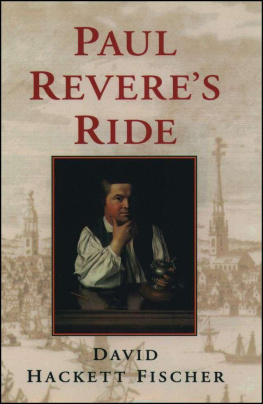
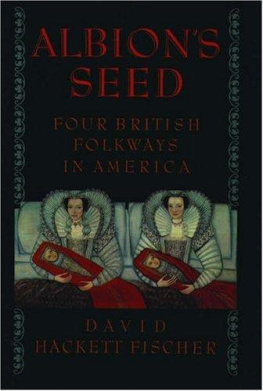
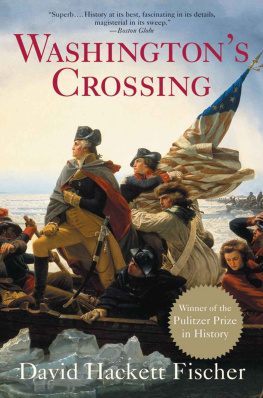

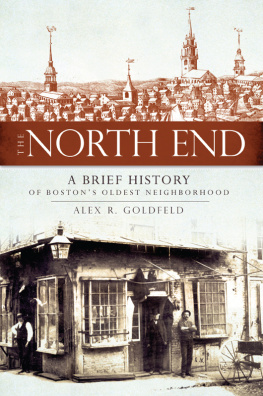
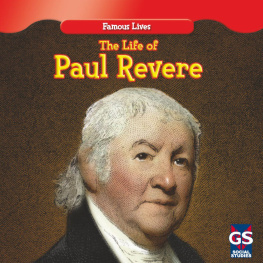
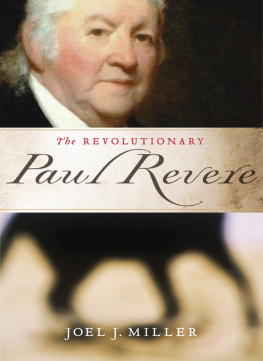
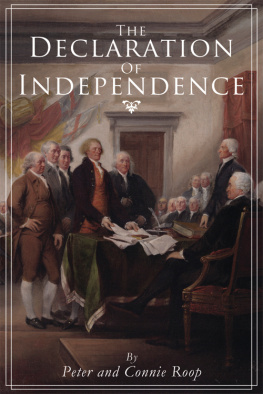
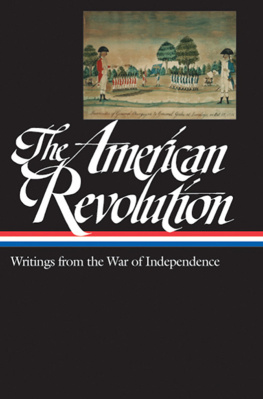

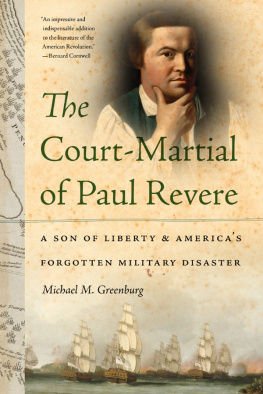
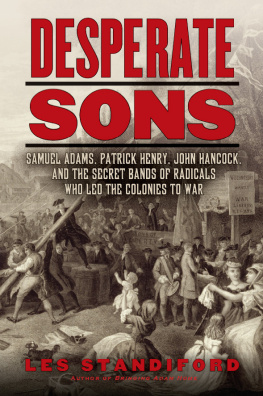

 Paul Revere Remounted
Paul Revere Remounted